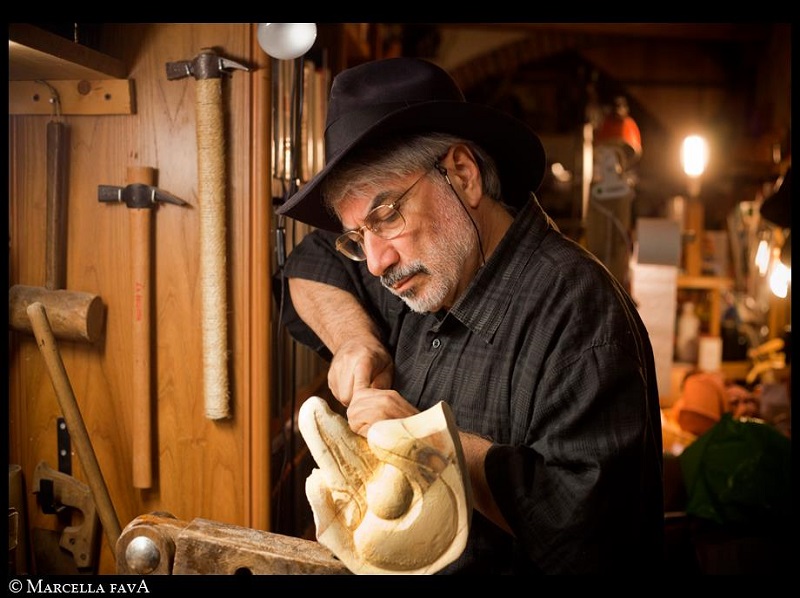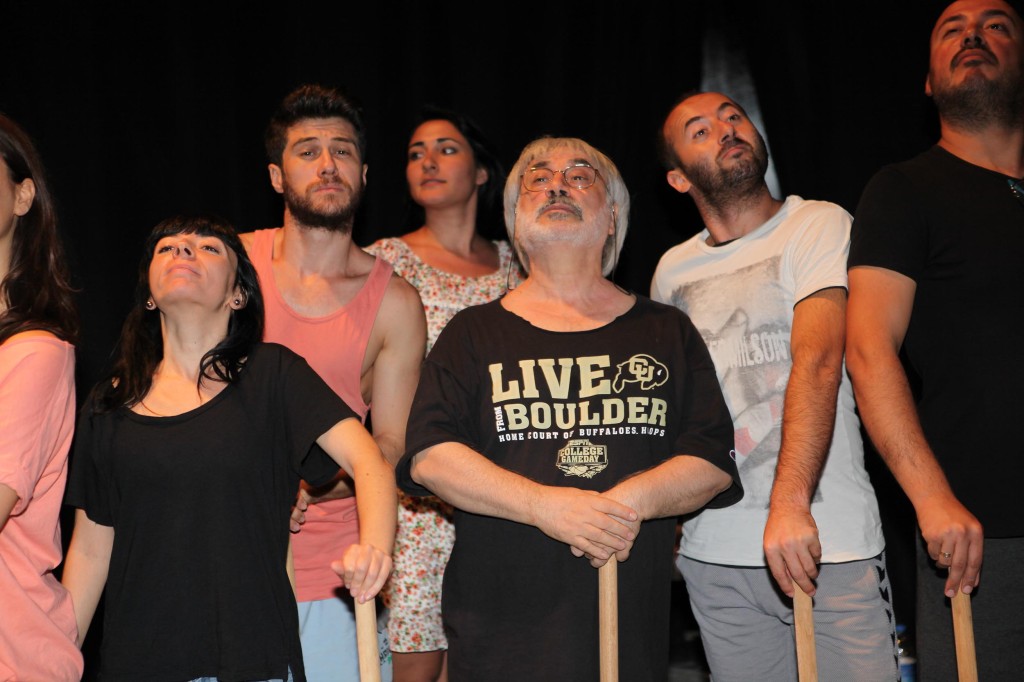One of the world’s greatest experts on Italian Renaissance Theater, Italy’s Maestro Antonio Fava—actor, director, teacher, practitioner, mask-maker, and author of one of the most comprehensive works on the famous Commedia dell’Arte—has taught quite a few Philadelphia-area actors and directors, including Cubby Altobelli, John Bellomo, Aaron Cromie, Dave Jadico, Rick Kemp, Benjamin Lloyd, Charles McMahon, Karen Saillant, Craig Tavani, and Blanka Zizka.
Local actors and dramaturgs are currently taking his one-week intensive at the Philadelphia Ethical Society, sponsored by the International Opera Theatre. The participants of the intensive workshop come from Harvard, New York, throughout Pennsylvania, and as far as California to study with Maestro Fava. Next week, he will teach at universities and works with private theater companies in the greater Philadelphia area.
Craig Tavani, actor-director; instructor at Immaculata University; and director of the fall plays at Phoenixville Area High School. He considers his vocation to be a socio-dramatist, applying theatre to “real life.” His experience with Antonio Fava greatly impacted his vision of theater and his own life. Tavani, with great joy, like other Fava followers, shared his perceptions of working with the Italian Maestro.

Henrik Eger: How do you feel about one of the most famous masters of Italian Renaissance theater flying in from Italy?
Craig Tavani: I am thrilled that World renowned Commedia dell’Arte Maestro Antonio Fava comes to Philadelphia in February. Having studied under Maestro Fava when he came to Philadelphia some years ago, I admire what he does, [teaching] authentic Renaissance commedia, the highest form of theater during the Renaissance.
Eger: How would you describe Fava’s style of teaching?
Tavani: Maestro Fava’s teaching style is something I want to emulate, especially his encouraging way of criticizing someone’s work—what I call critical kindness. When I teach Commedia, I am very much aware of what I learned from Maestro Fava, although I have made it my own, conformed to my own purposes in accordance with the resources available to me. As in life off-stage, behavior on stage is mostly a matter of body and breath being experienced in relationship with others.
Eger: Compared to other methods of teaching acting, what struck you as being different with his approach?
Tavani: In Commedia dell’arte, performance is much a matter of ensemble acting. Being a human being is to be with others. Training programs [in the US tend to] ignore much that is vital to the performer as a whole person in the society of others. Fava significantly emphasized the ensemble aspect of commedia. This gives a freedom to playing that liberates the performer.
I model my teaching after Fava’s very practical approach of getting students to DO STUFF right away. Maestro Fava has students perform immediately the same day as the lessons they just learned. He uses an actual audience to test what one has been taught.
Eger: You seem to have quite a bit in common with the Italian Renaissance teacher.
Tavani: Maestro Fava’s family works with him in teaching and performing. [Similarly,] I started the Theatre Guild at Phoenixville Area High School with my wife, Christine. Our whole family was involved together.

Eger: Could you give an example of how you introduced Commedia plays into an American environment?
Tavani: We have done commedia plays twice. Both were written by Hillary DePiano, adapting Carl Gozzi’s original work. The first was in 2007, The Love of Three Oranges. The second, in 2015, was The Green Bird. Our production was the play’s world premiere. In honor of Maestro Fava, I incorporated my own addition of a number of zanni characters [Zanni, a popular Commedia dell’arte character type, best known as a shrewd servant and trickster, first appeared in commedia seven centuries ago]—mostly [using] Pulcinella masks. I always seem to include some sort of zanni in anything I do.
Eger: His approach seems quite different from more general American ways of teaching improvisation. Was there ever any opposition to it by your drama students?
Tavani: It was a lot of work. Teaching masked acting is a bit of a hard sell. My biggest challenge was to convince my students to do a masked piece in our day and age. My wife teaches a commedia section in her theatre class which I help her teach each semester, so we have had the opportunity to familiarize a number of the students beforehand. Plus, the weekly workshops give me plenty of opportunity to teach them improvisational stuff, much of it influenced by my experience with Maestro Fava. Even though most improvisation may not be masked, I still insist on whole body acting and breathing.
Eger: You have read Fava’s famous work on Commedia dell’Arte.
Tavani: I admire what Maestro Fava wrote in his preface to his work on Pulcinella [a classical, Neapolitan character from Commedia dell’Arte, also known as Punch in the English speaking world. I was inspired by the following section in his introduction to Pulcinella, The Character Who Kept the Commedia dell’Arte Alive where he wrote:
In my work, through the great mask of Pulcinella, I will talk of the poetic and aesthetic essence of Commedia. I will talk of the technique and how-to-act, that is, physically, the structure of the Commedia. [. . .] It lies in the direct relationship between people, between social human beings, in two ways: in the situations presented on the stage and in the play given by the actors to the audience.
Eger: Did Fava model certain modes of acting?
Tavani: What I love about his teaching is how he models this in his classes, getting students to act freely, “mistakes” and all. There was a trust developed beyond any sort of relationship we could have created, apart from the challenge of having to perform together in public. I learned something deep that remains with me to this day—then as an actor, now as a director. I have tried to pass this [practice] on to the actors I now teach. Yes, it is hard work.
Eger: Hard work? Learning how to improvise often gets advertised as something easy that almost anyone can do.
Tavani: Somehowit has gotten into people’s heads that improv is just spontaneous silliness or forcing everything to be funny. Maestro Fava’s class was grueling, but should not each human relationship be something for which one is willing to work just as hard? Maestro Fava taught me the value of disciplined practice and serious theatre—no matter how comic.
Antonio Fava, world renowned Commedia dell’Arte expert, master classes in Philadelphia, sponsored by the International Opera Theatre at the Ethical Society of Philadelphia, February 8-12, followed by special visits to universities and theaters in the greater Philadelphia area, from February 15-19, 2016. Contact Karen Saillant at karen@internationaloperatheater.org for further information.
